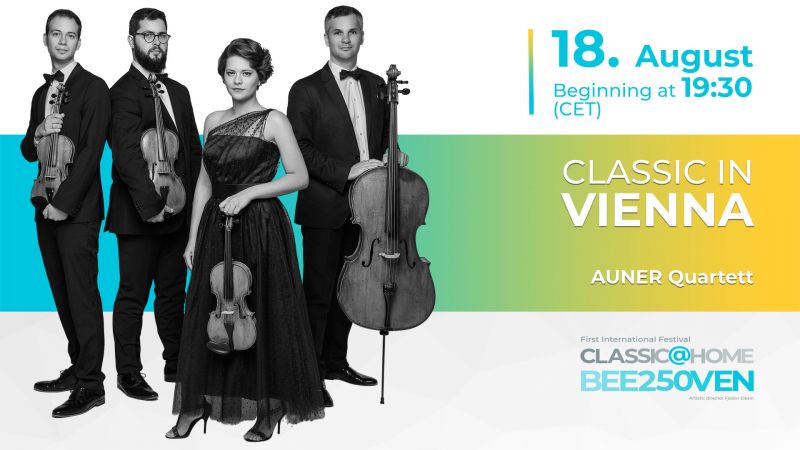Your support means a lot!
- OR -
Use the following bank details:
| IBAN (account No.) | DE40 2005 0550 1501 5028 58 |
|---|---|
| SWIFT | HASPDEHHXXX |
| Beneficiary | Classic at Home GmbH |
| Reference | Auner Quartett |
Bank name and address: Hamburger Sparkasse AG • Ecke Adolphsplatz / Gr. Burstah • 20457 Hamburg, Germany
Beneficiary's address: Paalende 24 • 22149 Hamburg, Germany
Ludwig van Beethoven turned to the challenging string quartet genre only when his first violin sonatas, string and piano trios won recognition, and Beethoven himself gained a status of fashionable composer in Vienna. At that time Beethoven still stood under the influence of the quartets by Mozart and his own teacher Haydn: he fine-tuned his earlier compositions, including the pieces of the Bonn period, to conform to stylistic requirements of that time. However, it can be stated that six of Beethoven’s quartets (op.18) mark a milestone in the history of string quartets and signify the entry of that genre into the 19th century. The latest pieces of the great composer also include string quartets, which, same as many of his other later works, were far in advance of their time and are still perceived by some as “new music”. Today we will here a compositional highlight, the third part of the next-to-last quartet by Beethoven, subtitled “Holy song of thanks to the Divinity, from a convalescent, in the Lydian mode." By its sound and technique the piece evokes an impression of a medieval chant, broken in two places with two “modern” dancing episodes typical for later Beethoven. The third part of the quartet indeed marks the composer’s recovery from a hard illness.
Vienna string ensemble Auner Quartet, a winner of the Eugéne Ysaÿe competition in Belgium, sweepingly gained international fame and ranks among one of the best quartets in the world. During 2020/21 season the Austrian Ministry of Foreign Affairs assigned to the quartet the status of cultural ambassador of Austria within the NASOM support program for young musicians: for Auner musicians that became a pass to the international network of cultural forums and diplomatic events where they regularly give concerts. The quartet includes Daniel and Barbara Auner (violins), Nikita Gerkusov (viola) and Konstantin Zelenin (cello). The musicians’ signature is “elegance, quality and sophistication of performance”, the press notices.
Ludwig van Beethoven
String quartet No.4 C minor, op.18 No.4 (1800)
- Allegro ma non tanto
- Scherzo. Andante scherzoso quasi Allegretto
- Menuetto. Allegretto
- Allegro - Prestissimo
Third movement of string quartet No.15 A minor op.132 (1825)
Canzona di ringraziamento. Molto adagio
(Holy song of thanks to the Divinity, from a convalescent, in the Lydian mode)
Suggest your concert
You want to show your own concert on our website? Or do you want to recommend a great artist?
Contact us, and we get in touch as soon as we can!




